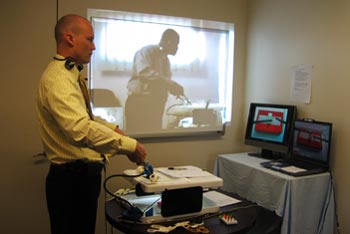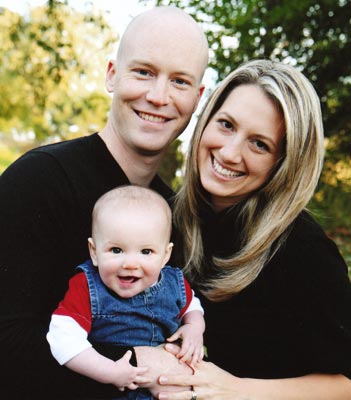Teaching Minimal Access Surgery in Africa Using Skype

Allan uses telesimulation to teach a surgeon in Botswana laparoscopic
suturing
Laparoscopic general surgeon Allan Okrainec's research
focus is on the use of simulation for surgical education.
He is currently completing a Masters degree in education
at the University of Illinois in Chicago. Two years ago,
Georges Azzie, paediatric surgeon at the Hospital for Sick
Children, invited Allan to accompany him to Botswana
to participate in Georges's long term project providing
surgical care and education in Gaborone and Francistown.
Lloyd Smith, a gifted laparoscopic surgeon from St.
Joseph's Hospital joined them to help with the training.
Because of his focus on education, Allan wanted to include
the simulation-based Fundamentals of Laparoscopic
Surgery (FLS) course as part of the educational program.
FLS is a rigorous training course comprised of simulation
training exercises and a written test. It was developed by
the Society of American Gastrointestinal and Endoscopic
Surgeons (SAGES), and is now also endorsed by the
American College of Surgeons.
The Botswana surgeons were able to double their
initial scores after the training visit. However, only two
of twenty surgeons were able to achieve an overall score
required for FLS certification. The challenge was how to
continue and reinforce the hands-on training. We have
learned from Allan's colleague Carol-Anne Moulton at
the Wilson Centre for Research in Education that distributed
practice over time is superior to intensive short term
training. Since the trip to Botswana is a 26-hour
sojourn from Toronto to Frankfurt to Johannesburg to
Gaborone, regular follow-through training sessions were
not feasible. Allan solved this problem with telesimulation
using Skype, the software for video conferencing
over the internet.
Telesimulation uses the internet to link simulators
between an instructor and trainee in different locations.
Using two simulators, computers, and a series of webcams,
the instructor can teach a trainee as if they were
in the same room. Conditions in Botswana provided a
natural experiment that could validate the telesimulation
approach. Surgeons in Gaborone had good internet
access; surgeons in Francistown did not. Both groups
had unlimited opportunities to practice with the simulation
box. Allan and Georges applied for and received
a SAGES grant to test the telesimulation hypothesis.
Seven of eight surgeons in the telesimulation curriculum
passed the FLS exam, while only one of eight in
the control group succeeded. The experiment has been
extended to Columbia where 20 of 20 students qualified,
and to Peru where 15 of 15 have qualified. The success
of the program has been catalyzed by Oscar Henao,
a surgeon from Columbia and current research fellow
in the telesimulation lab at Toronto Western Hospital.
Oscar travels widely for the project and translates for
the teleconferences. Oscar is a fully-trained surgeon who
will become a clinical fellow in the University of Toronto
laparoscopic surgery program starting in July. There is
currently a telesimulation course ongoing in Guyana,
and soon others will start in Hungary and Nigeria. The
next frontier is China.
|
One of the unsolved problems involves training of the
entire medical team as well as maintenance of infrastructure.
Cleaning and maintenance of equipment, preparation
as well as handling of the instruments by operating
room personnel all require deepening of the educational
process. To address these needs, Allan and his colleagues
are developing a Centre for Studies in Telesimulation
and International Health Education at Toronto Western
Hospital. Through this centre the team will broaden
their educational programs to train other health care personnel.
The focus will be on "training the trainers" in the
hopes that students in the program will ultimately go on
to teach others in their own countries. The equipment
for telesimulation has thus far been purchased through
the SAGES grant and a generous donation from a former
patient, but funding for the program remains a challenge.
Allan continues to seek external grant funding, as
well as support from private donors and foundations.

Allan Okrainec with wife Joelene and daughter Madison
Allan was born in Gatineau, Quebec. He completed
his medical degree and minimally invasive surgery fellowship
at McGill, the latter under Gerald Fried, a pioneer in
laparoscopic surgical education. Allan finished his general
surgery training at McMaster in 2005. During medical
school at McGill, Allan met his wife Joelene who is a
paediatrician currently doing her fellowship in developmental
paediatrics. Joelene and Allan recently welcomed a
new addition to the family. Their 10-month-old daughter
Madison has already traveled with them to Hawaii, Italy
and Holland. Allan enjoys hockey, snowboarding and
traveling. His telesimulation laboratory, ably staffed by
Oscar, is always open for residents and faculty to develop
their skills. Click here to link to The Globe and Mail article describing
Allan's work.
M.M.
|